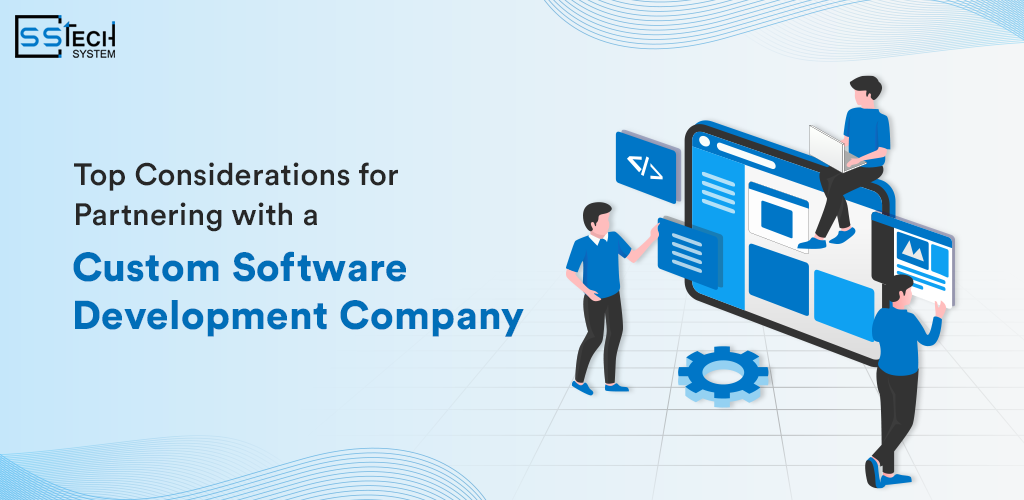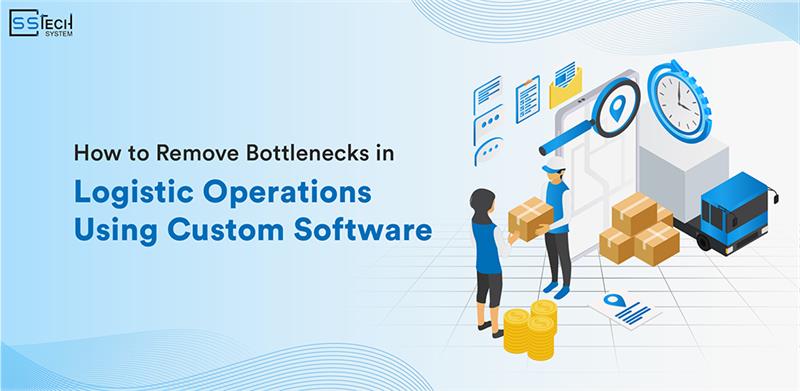
The custom software development market is growing exponentially in the previous years and 2025 will not be an exception. Grand View Research estimates that the world market of custom software will see a market of over 52.8 billion with the custom software CAGR of 22.6% over the next five years, as firms in all industries (health care and finance) to e-commerce and logistics) are realizing the need to create and use unique operational requirements, improve customer experiences, and innovate through custom software.
iTransition reports that business organizations are definitely moving towards higher requirement of custom software to be created and used in unique ways in order to meet the unique operational needs, customer experiences enhancement, and innovations.
Companies are also resorting to outsourcing software development due to the lack of specialized skills, flexibility, or capacity to outsource software development teams and complex projects effectively within the companies.
The external partners introduce the technical expertise, the exposure to the most recent technologies and the tried and tested practices which assist the organization to produce high quality software within time and budget constraints.
However, choosing the wrong partner can create significant risks:
- Risks to Data privacy: Lack of privacy protocols may cause data leakage, sensitive customer and business data will be exposed to attack and it may also lead to a loss of reputation.
- Budget Overruns: – Projects that are not handled by skilled and expert managers are prone to increase in price therefore, ROIs will be delayed and financially constrained.
- Business Risks: Mismatched goals, ambiguity or inability to perform the task technically could derail operations and lower productivity, as well as affect customer confidence.
Real-World Horror Stories: Learning from Others’ Mistakes
- E-commerce Black Friday Crash: Black Friday affected one of the largest online retailers in the US, which crashed catastrophically on Black Friday because of server overloads and the lack of proper testing. The failure brought about millions of lost revenue, unhappy customers and significant reputational damage in the long run. (BetterCommerce).
- Banking App Security Flaws: A widely used banking application had significant security bugs that enabled anyone to gain electronic access to user profiles. The event caused a major violation of consumer confidence and legal reporting.
- Retail Chain Inventory Errors: A retail company had a huge loss of money because it couldn’t track the inventory accurately and the software was not managed properly, leading to a stock-out and overstocking in their store which cost them millions of dollars in revenue loss. (KhaosControl).
These illustrations underscore the importance of choosing the appropriate software development company as a crucial business decision. It is important to note that a trusted partner is able to not only assist in crashing your operations way down the road but he/she also serves as a strategic tool to ensure that your software can sustain growth, invention, and future prosperity.
What Is a Software Development Partner?
A software development partner is not just another external supplier but a long-term partner working with your firm to design, develop, and maintain custom-built software solutions in line with the business’s operational and strategic objectives.
Strategic partners deliver an all-encompassing view of digital transformation compared to the traditional vendors, who, in most cases, adopt a narrow perspective in delivering certain tasks or products.
Their role includes:
- Knowing where you actually want to go in the business and how to translate it into technical solutions.
- Offering knowledge in contemporary technologies, structures, and designs.
- The quality assurance and security standards along with compliance standards, are incorporated into the development lifecycle.
- Scalability to make your software match your expanding business requirements.
- Providing after-sales services and constant upgrades to make the product remain competitive.
Vendor vs. Strategic Partner
| Feature | Software Vendor | Strategic Partner |
|---|---|---|
| Relationship | Short-term, transactional | Long-term, collaborative |
| Engagement | Task-based, limited scope | End-to-end, aligned with business goals |
| Expertise | Focused on specific technologies | Broader industry knowledge and technical depth |
| Value | Delivers software | Adds business value and strategic insight |
| Flexibility | Fixed scope and rigid processes | Adaptable and scalable based on needs |
This comparison highlights that strategic partners are ideal for organizations seeking sustainable growth and innovation, whereas traditional vendors may only fulfill immediate, short-term requirements.
Who Needs a Software Development Partner?
Different businesses have varying needs, but several types of organizations benefit significantly from partnering with a custom software development company:
- Startups which require the development of MVP- Startups usually have a limited budget and time. Collaboration with a mature company that has worked in various development projects enables startups to release a minimum viable product (MVP) faster, validate their market assumptions, and evolve through the feedback of its users without having to bring in full-time developers.
- SMBs In Search of Inexpensive Scaling: Small and medium-sized businesses (SMBs) hold internal teams but do not possess professional experience in contemporary technology stack. With the help of a software development partner, SMBs can effectively scale their digital capabilities, and this allows them to manage their costs.
- Complex Digital Ecosystem Software: Large organizations regularly utilize various integrations, enterprise applications, and legacy systems in numerous departments. Collaborating with a trusted software development firm will make the complex projects well handled and with the implementation of the best practices, compliance and high standards of security and performance.
By identifying your business type and particular requirements, one can find the technology partner for software development that corresponds to the goals that would guarantee the efficient project realization and its success in the long term.
Why Work with a Software Development Partner?
Remote access, real-time information availability, and no hardware-associated costs are expected to drive the growth of the web-based solutions segment, with CAGR of 21.1%a from 2025 to 2030. Having a trusted software development firm to partner with provides businesses with much more than just cost savings.
This is why engaging in a software partnership is a significant difference:
- Availability of Expert skills and new tech Stacks: Technology changes fast. A trusted partner possesses understanding of state-of-the-art structures, programming systems, cloud systems, artificially intelligent/artificial intelligence solutions, and cybersecurity standards. You are also able to have the benefit of instant access to experts capable of architecting scalable and innovative software solutions as opposed to months of training an in-house team.
- Better Time-to-Market and Economy: With a proven partner, a business can speed up development processes, lessen trial and error costs and eliminate some of the pitfalls that take internal development teams time. Quicker delivery will help businesses to take advantage of opportunities in the market, win over competitors, and begin to make ROI earlier.
- Concentrate on Core Business and Leave Technology to Experts: Building and supporting custom software in house may cause your team to be distracted with business strategy. An IT development partner will enable your staff to work on interacting with customers, marketing, and operational excellence, as technocratic specialists will deal with technical implementation effectively.
Why Working With a Partner is Different From Hiring an Employee?
Hiring a full-time employee may seem like a straightforward solution, but partnering with an external software company offers distinct advantages:
- Elasticity in Engagement Forms: It offers a spectrum of engagement models, whether with the partners towards fixed-price contracts or dedicated teams or hybrid models so that you can scale the resources in proportion to your project scope and schedule.
- Availability of a Larger Talent Pool: You can access global talent pools as opposed to the experience of the local employees. This guarantees technology stack expertise in each technology stack, both cloud-native applications and enterprise software architectures.
- Scalable on Demand: The requirements of projects may change with time. A development partner allows expansion or contraction of a team within a short time, and also allows efficient resource use without any long-term fulfillment.
What to Look for in a Software Development Partner?
Finding the right partner requires evaluating multiple critical factors. Here’s a detailed guide:
- Technical Expertise and Industry Knowledge: Make sure that the partner has experience in your industry, has a knowledge of regulations and business concerns, and has implemented successful projects based on technologies similar to yours.
- Engagement Models: See how the partner works together. As an example, SSTech provides focused dedicated software team, managed services, and project-based contracts, which can be aligned to your business.
- Project Management Practices: Find partners that adhere to Agile, Scrum, or Kanban systems that check-in on it and have the ability to deliver products on a timeline.
- Quality & Security Standards: Check certifications like ISO, GDPR compliance, automated testing processes, code review procedures, and secure coding practices to reduce risks.
- Communication & Collaboration: It is extremely important to keep the project visible and accountable. The best way to achieve this is through transparent reporting, working in sync with your time zone, and using effective software development company collaboration tools (e.g., Jira, Trello, Slack).
- Cultural Fit and Long-term Vision: Select a match of partner whose values and beliefs collaborate with your organization. A firm that invests to understand your strategic goals can bring about steady innovation, sustained support and solutions that are driven by business instead of just delivering technical solutions.
How to Vet and Select the Right Development Partner?
Selecting the right partner requires thorough research and evaluation:
- Research Platforms: First, check reputable websites like Clutch, GoodFirms, G2, and LinkedIn, where the best partners are rated based on their experience and client satisfaction.
- Review Page and Testimonials: Check out past experience to detect quality, innovativeness, as well as command of the domain. They should read client reviews to understand how the partner communicates, how reliable the strategic software partner can be, and how he/she can solve problems.
- Pilot Project or Proof of Concept: Before engaging in full-scale cooperation, it is possible to test collaboration by conducting a small pilot project to assess technical skills, responsiveness, and process compatibility.
- Check SLA and Post-Launch Support Policies: Have the partner sign good agreements about the maintenance, support, and uptime guarantees which are crucial to the future functionality of your software.
| Step | Action |
|---|---|
| Research Platforms | Check Clutch, GoodFirms, G2, LinkedIn |
| Evaluate Portfolios & Testimonials | Review past work and client feedback |
| Run Pilot Project / PoC | Test collaboration on a small-scale project |
| Check SLA & Post-Launch Support | Confirm maintenance, support, and uptime policies |
Common Pitfalls to Avoid
Even experienced organizations can make mistakes when choosing a software development partner. Avoid these common pitfalls:
- Software Development Partner Choosing a partner based on the lowest possible cost may lead to compromise in quality, security, and project schedules. The lesser of the evils can be more expensive than expected because of rework and time wastage.
- Poor Understanding of Security & Compliance Standards: Failing to evaluate compliance with data protection laws and various other mechanisms of data protection technologies and required standards could put your business in jeopardy, leading to data breaches, fines, and loss of reputation.
- Ignoring Scalability and Future Requirements: Choosing a company that does not scale with your needs can lead to returning to the process of moving to a different system or facing acute technical debt. Never stop to consider whether the partner would know how to scale and expand features in the long term.
- Failure in Due Diligence of Reference Checks: Failure to check references, previous projects or customer reviews may cause surprises in the future. Make sure that you address previous customers directly and establish the project deliverables, schedule, and problem-solving skills of the offshore software development partner.
Signs You’ve Found the Right Partner
Finding the right software development partner can make or break your digital initiatives. Several key signs indicate that you’ve found a partner who is not only capable but also committed to your long-term success:
Active communication and Openness:
A trusted partner means a regular flow and transparent communication. They update on the project too often, on the progress, and give instant response in regards to the possible road blocks.
This is a proactive strategy, which helps in preventing the occurrence of misunderstandings and makes sure that the project is in line with your business goals in all phases. Trust is also cultivated through open communication and cooperation becomes easier and more productive.
Illustrated Knowledge of Your Industry/Business Objectives:
The right business partner takes time to learn about your business model, target market, and your industry predicaments. This understanding can enable them to provide solutions that are consistent with your strategic objectives, predict the risks likely to occur as well as suggest technologies that can add value to operational efficiency and user experience.
Ready to Innovate and Recommend Change:
The application development partner in question is not a follower of directions, but a thinker who is ready to develop innovative approaches that would be used to streamline processes, better performance, or make them easier to use.
It may involve the proposal of new structures, automating programs, or design components that both save time and cost, together with the enhancement of the quality of products.
History of Trust and Existing Track record of Success:
A good software partner should have a history of successful project, with case studies and customer reviews that can be verified. This fact demonstrates that they have the capability of providing quality results that meet the schedule and within budget. Assessment of the successes of the past can reassure you that your partner will be able to work on complicated projects and unpredictable situations.
Why the Right Custom Software Partner Matters?
Selecting the right partner is not just about completing a project—it has strategic implications that can significantly impact your business:
Long-Run Effect on Business Development and Innovativeness:
The appropriate partner can assist your business in adopting innovative solutions and new technology. Their expertise helps you explore AI adoption, cloud computing, and scalable structures that drive growth and efficiency. Their suggestions and insights tend to lead to more competitive, friendly, and advanced products.
Less Risk, More Productivity, and Enhanced ROI:
A strategic bespoke software partner lessens risks by providing compliance with security, excellent quality of code and tough testing processes. This minimizes the failure of projects and unwarranted expenses. Your organization can achieve shorter development workflows, embrace agile methodologies and best practices, and ensure faster deployment cycles with measurable ROI.
Strategic Advantage in Competitive Markets:
A strong partner gives business a competitive advantage. They will be able to react more quickly to the dynamic needs of the market, implement new functionality even before rivals, and have a strong digital base that ensures the ability to scale with results and further developments.
Signs Your Business Needs a Software Development Partner
The software testing segment within the software engineering market is expected to hold a share of over 38% by 2032. Even well-established companies can benefit from an external software partner.
Here are clear signs indicating that your business might need one:
Difficulty scaling internal teams:
When your internal developers face overload or lack specific skills, a trusted software development partner like SSTech System can quickly scale your team, provide immediate expertise, and eliminate the need for long training or tight deadlines.
Low levels of expertise about new technologies:
New technologies like AI, blockchain, cloud-native solutions, and IoT involve specialists. Collaboration enables your organization to remain technologically active and exploit such tools successfully.
Slow Digital Projects:
Projects that regularly miss deadlines or experience technical stalling will need external help. A partner can simplify the development process, agilely use best practices, and speed up the time-to-market so that your digital efforts are monumentally accomplished.
Increasing Compliance or Integration Requirements:
Companies that require finance, healthcare or foreign functioning, tend to feel intense conformity to control and intricate integrations. An informed partner would be able to manage these demands which minimizes the risks as well as your systems being conformed with all the standards required.
Pay attention to the fundamentals of the business:
When your internal team focuses on technical implementation, collaboration allows your organization to concentrate on strategic business outcomes, enhance customer experience, and drive market growth. Your trusted partner becomes an integral part of your team, managing all technical aspects while you focus on advancing business goals.
Conclusion
The identification of the appropriate software product development partner is one of the most serious strategic choices that the company can make in the current dynamic digital environment.
An able partner offers technical knowledge and industry acumen and novel ideas, and it assists your organization to switch its digital transformation with ease and proficiency. A reliable partner accelerates your business growth, speeds up time-to-market, and ensures every project delivers high-quality, secure, and scalable results.
They include almost an extension of your internal team and are flexible in terms of engagement model, access to professional expertise and provide active direction during the project lifecycle. Through strategic partnerships, various businesses can avoid the most typical pitfalls, such as budget overrun, failure to meet deadlines, and compliance issues, and reap maximum ROI and operational efficiency.
Finally, a quality software development partner is not merely a service provider but a strategy partner, technology guide, and extended partner. Through proper choice of a partner that will support your business goals and objectives, values, firm vision, and future growth, your organization could create innovative, scalable, and secure digital products that lead you to success, satisfaction of your customers and your sustainable competitive edge over time.
Frequently Asked Questions
The right partner provides secure, scalable and quality software delivery and mitigates business risks, cost control and technology decision-making in line with long term business objectives.
Find excellent technical skills, business experience, effective communication, established project management procedures, security, and it should be able to grow with your business objectives.
Software development partner has the advantage of flexible engagement model, a pool of global talent, scalable faster and expansive technology knowledge without the expensive costs of hiring and training on long-term services.
Examine portfolios, client reviews, industry ratings, security credentials, and pilot project or proof of concept in order to evaluate technical expertise, interpersonal skills and delivery capability.
Considering a partner is always a good option as businesses encounter skill shortages, scaling issues, complex integrations, strict deadlines, or advanced technologies such as AI, cloud, or enterprise.






